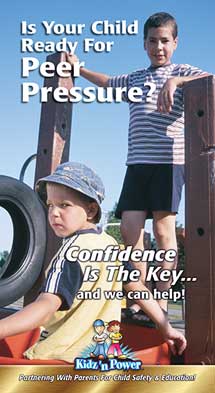
5 Tips to Help Your Child
Deal with Being Different
Feeling Different Can Be Tough for Children
As many of you know, it's a struggle for many children, whether they feel too tall, too short, too thin, too fat, or “too” something else. To give the other side of the coin, here are tips to help your child deal with being different:
-
Be Careful About Transferring Your Worry:
As caring parents, it's common to become worried about your child's height, and weight. While the concern is good intentioned, these worries might lead to repeated measuring, comparing, and doctor's visits. When we transfer our worries to our child in this way, it teaches him/her that his height and weight is an issue– even if in the child's view, this wasn't the case until it was brought to his attention. - Don't Compare:
Grade school is often about “who's in, who's out” which can be determined by as little as the color shirt the child is wearing that day. As parents and teachers, it's important that we don't inadvertently make our children feel inadequate by comparing them to siblings and friends. Lining up by height or comparing how high someone's mark is on the weight chart in comparison to others may feel more like a competition than interesting fact. A comparison can make them feel that they will never “measure up.” - Watch Your Language:
Often comparisons or statements are tainted with language bias. Parents and other family members might not think they're being hurtful, but they're language may be sending messages that celebrate taller members and denigrate shorter ones. Nicknames may be said in jest but received as mockery. One of my coaching clients, a parent of two sons, told me that their grandmother would joke; “you wouldn't believe they're brothers– my Thomas is so short I feel like I can scoop him up like a rag doll and my Tony is so tall that I think he must hang the rainbows up after it rains.” The former sends a message of insignificance while the latter sends a message of superhuman qualities. It's no wonder that Thomas always felt that his family looked at him like he was still a baby even though he was 12 years old. - Celebrate All Different Heroes:
Children need to be able to picture themselves and people like themselves as the heroes every once in a while. Superheroes, presidents, and sports stars are often described as being tall, thin and strong. However, there are plenty of heroes who are different in stature while still being highly regarded. Exposing children to different kinds of people of varying sizes, both from our history as well as from our own communities, can help children see that anyone can be successful no matter how different they are. - Don't Allow Being Different To Dictate Their Involvement:
Life doesn't have to be a series of signs that read “too short to ride this ride.” Individual sports like swimming, dance, gymnastics, and martial arts arrange children by skill level and age rather than by skill level and height or weight. Jessie, a girl with dwarfism, began martial arts at age six. While some skills needed to be altered for her size and physical differences, she was able to excel as a leader in her class. Sometimes limitations come from our own limiting thoughts (or what we have been told) rather than what is truly accurate. Jessie excelled because she could and nobody told her that she couldn't. And of course, talk to your child. Ask him or her how s/he feels, what s/he wants and what s/he hopes to become. Support these dreams just like you would any child. When it comes to our children, no matter how different they are, it's important that we don't sell them short.


